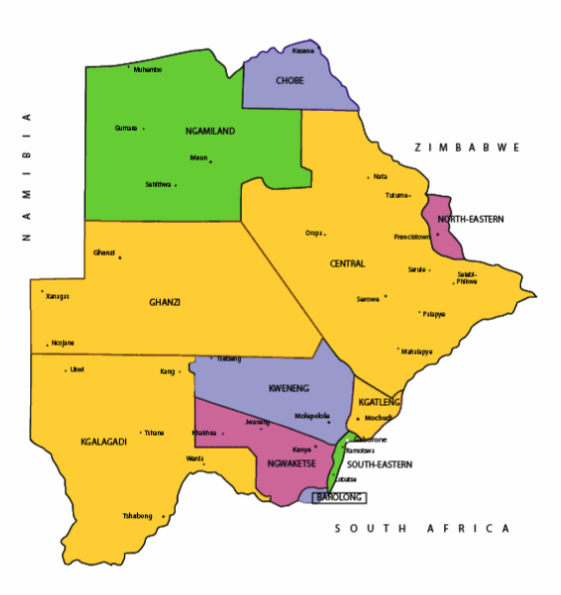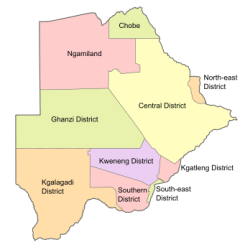Places and their polling stations in Bobonong, Botswana
15 Bobonong
120 Lepokole-Borotsi
0619 Lepokole Primary School
0620 Borotsi Primary School
121 Mabumahibidu
0621 Bobonong JSS
0622 Bobonong Primary School
0623 Bobonong Community Hall
0624 Mabumahibidu Primary School
122 Rasetimela
0625 Phakwe Mobile Health Stop (Tent)
0626 Rasetimela Primary School
0627 Assemblies of God Church
0628 Dbes Office
123 Dandane-Mabeleng
0629 Mosetlha JSS
0630 Madikwe Primary School
0631 Modisaotsile Primary School
0632 Matshekge SSS
0633 Metsibotlhoko Mobile Health Stop
124 Masego
0634 Gobojango Primary School
0635 Gobojango JSS
0636 Semolale Primary School
0637 Mabolwe Primary School
125 Molalatau
0638 Molalatau Primary School
0639 Molalatau JSS
126 Motlhabaneng-Lentswelemoriti
0640 Motlhabaneng Primary School
0641 Motlhabaneng Community Hall
0642 Lentswelemoriti Primary School
0643 Point Drift Border Post (Tent)
0644 Talana Farm (Tent)
127 Mathathane
0645 Mathathane Primary School
0646 Badale JSS
0647 Mathathane Community Hall
128 Moletemane
0648 Moletemane Primary School
0649 Richmark (Tent)
0650 Zanzibar Border Post (Tent)
129 Tsetsebye
0651 Tsetsebye Primary School
0652 Busang Primary School
0653 Tsetsebye JSS
0654 Tsetsebye Community Hall
Reference: iec.gov.bw/index.php/electoral-districts/polling-stations.html
Botswana
Botswana is a country in Africa. It is topographically flat, with approximately 70 percent of its territory being the Kalahari Desert.
It is bordered by South Africa to the south and southeast, Namibia to the west and north, and Zimbabwe to the northeast.
Capital: Gaborone
Currency: Botswanan Pula
Official language: English
Population: 2.588 million (2021) World Bank
Dialing code: +267
Gross Domestic Product: 17.61 billion USD (2021) World Bank
Botswana’s ten districts are:
- Southern District
- South-East District
- Kweneng District
- Kgatleng District
- Central District
- North-East District
- Ngamiland District
- Kgalagadi District
- Chobe District
- Ghanzi District
Botswana’s councils created from urban or town councils are: Gaborone City, Francistown, Lobatse Town, Selebi-Phikwe Town, Jwaneng Town, Orapa Town and Sowa Township.






The name Botswana refers to ‘Land of the Tswana’. The landlocked, Southern Africa country is officially known as the Republic of Botswana.














Botswana is connected to Zambia through the Kazungula Bridge making it the world’s shortest border between two countries.
A country of slightly over 2 million people (2021), Botswana is one of the most sparsely populated countries in the world. It is essentially the nation state of the Tswana ethnic group, who make up 79% of the population.

About 11.6 per cent of the population lives in the capital and largest city, Gaborone.
Formerly one of the world’s poorest countries—with a GDP per capita of about US$70 per year in the late 1960s—it has since transformed itself into an upper-middle-income country, with one of the world’s fastest-growing economies.


The Tswana ethnic group were descended mainly from Bantu-speaking tribes who migrated southward of Africa to modern Botswana, living in tribal enclaves as farmers and herders.




In 1885, the British colonised the area and declared a protectorate under the name of Bechuanaland.
As colonisation stopped, Bechuanaland became an independent republic under its current name on 30 September 1966.


Since then, it has been a representative republic, with a consistent record of uninterrupted democratic elections and the lowest perceived corruption ranking in Africa since at least 1998.

The economy is dominated by mining and tourism. Botswana has a GDP (purchasing power parity) per capita of about $18,113 as of 2021, one of the highest in subsaharan Africa.


Botswana is the world’s biggest diamond producing country.
Its relatively high gross national income per capita gives the country a high standard of living and the third-highest Human Development Index of continental Sub-Saharan Africa (after Gabon and South Africa).
The country has been adversely affected by the HIV/AIDS epidemic. In 2002, Botswana began offering anti-retroviral drugs (ARVs) to help combat the epidemic.
Botswana is a member of the Southern African Customs Union, the Southern African Development Community, the Commonwealth of Nations, and the United Nations.

